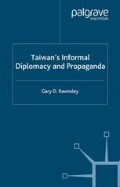Abstract
This study has been driven by an interest in how governments which are obliged to enter into informal diplomatic relations with other governments are required to engage in propaganda. At its core is the recognition that while diplomacy and propaganda may still be separate creatures, their interaction is now greater than ever before. First, it is pertinent to offer a number of general observations. This framework will then permit a more meaningful evaluation of the Republic of China’s effort and impact to be made.
Diplomacy, one might say, is the brains of national power, as national morale is its soul. … Often in history the Goliath without brains or soul has been smitten and slain by the David who had both.
Hans J. Morgenthau1
Access this chapter
Tax calculation will be finalised at checkout
Purchases are for personal use only
Preview
Unable to display preview. Download preview PDF.
Notes
These methods are explored in J.A.C. Brown, Techniques of Persuasion: from Propaganda to Brainwashing (Harmondsworth: Penguin, 1963).
Chris Van Minh, ‘ROC bid for voice in UN undeterred by slow going’, FCJ, 25 September 1998, p. 6.
In particular, see Leonard A. Kusnitz, Public Opinion and Foreign Policy: America’s China Policy, 1949–1979 (Westport, Conn.: Greenwood Press, 1984);
T. Christopher Jesperson, American Images of China, 1931–1949 (Stanford: Stanford University Press, 1996);
Brian Porter, Britain and the Rise of Communist China: a Study of British Attitudes, 1945–1954 (London: Oxford University Press, 1967);
Zhong-ping Feng, The British Government’s China Policy, 1945–1950 (Keele: Ryburn, 1994).
Author information
Authors and Affiliations
Copyright information
© 2000 Gary D. Rawnsley
About this chapter
Cite this chapter
Rawnsley, G.D. (2000). Conclusions. In: Taiwan’s Informal Diplomacy and Propaganda. Studies in Diplomacy. Palgrave Macmillan, London. https://doi.org/10.1057/9781403905345_6
Download citation
DOI: https://doi.org/10.1057/9781403905345_6
Publisher Name: Palgrave Macmillan, London
Print ISBN: 978-1-349-41231-0
Online ISBN: 978-1-4039-0534-5
eBook Packages: Palgrave Political & Intern. Studies CollectionPolitical Science and International Studies (R0)

